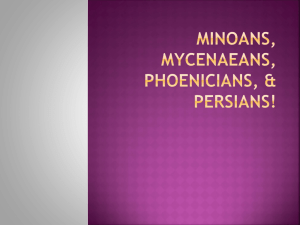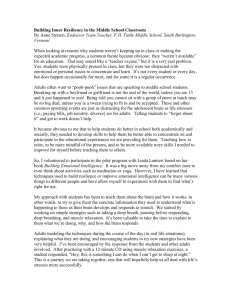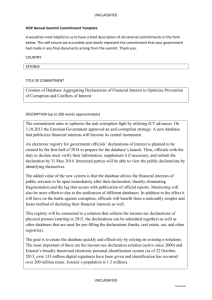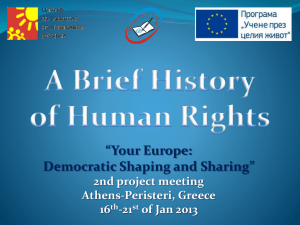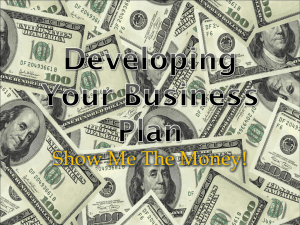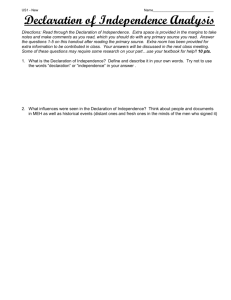Transcript for video.
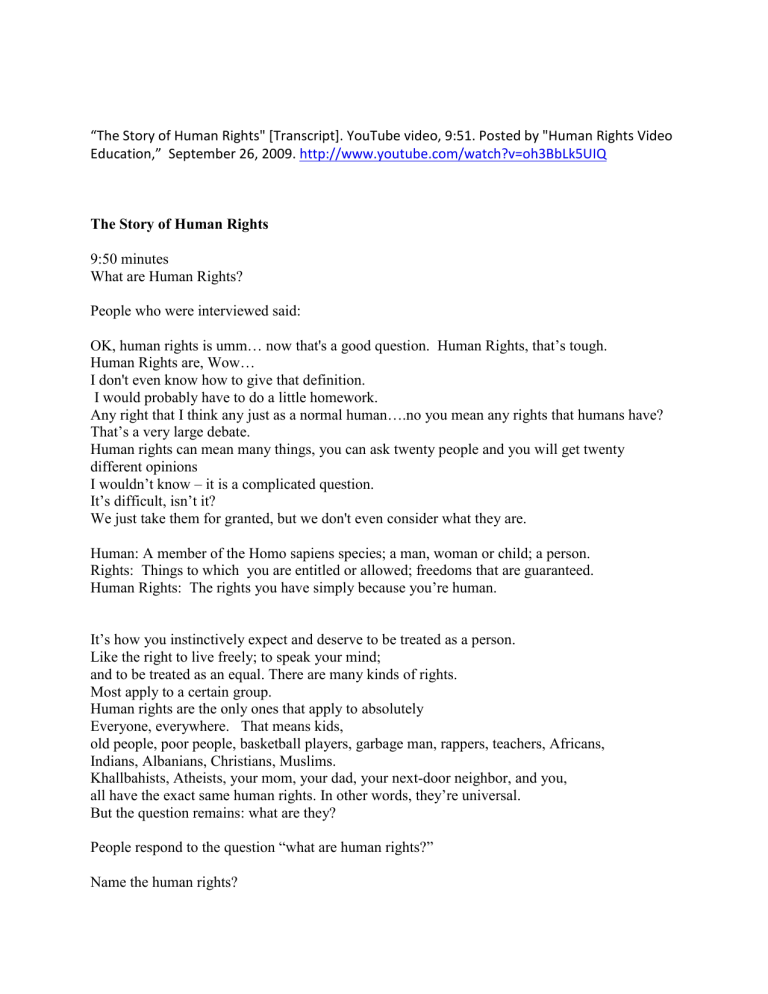
“The Story of Human Rights" [Transcript]. YouTube video, 9:51. Posted by "Human Rights Video
Education,” September 26, 2009. http://www.youtube.com/watch?v=oh3BbLk5UIQ
The Story of Human Rights
9:50 minutes
What are Human Rights?
People who were interviewed said:
OK, human rights is umm… now that's a good question. Human Rights, that’s tough.
Human Rights are, Wow…
I don't even know how to give that definition.
I would probably have to do a little homework.
Any right that I think any just as a normal human….no you mean any rights that humans have?
That’s a very large debate.
Human rights can mean many things, you can ask twenty people and you will get twenty different opinions
I wouldn’t know – it is a complicated question.
It’s difficult, isn’t it?
We just take them for granted, but we don't even consider what they are.
Human: A member of the Homo sapiens species; a man, woman or child; a person.
Rights: Things to which you are entitled or allowed; freedoms that are guaranteed.
Human Rights: The rights you have simply because you’re human.
It’s how you instinctively expect and deserve to be treated as a person.
Like the right to live freely; to speak your mind; and to be treated as an equal. There are many kinds of rights.
Most apply to a certain group.
Human rights are the only ones that apply to absolutely
Everyone, everywhere. That means kids, old people, poor people, basketball players, garbage man, rappers, teachers, Africans,
Indians, Albanians, Christians, Muslims.
Khallbahists, Atheists, your mom, your dad, your next-door neighbor, and you, all have the exact same human rights. In other words, they’re universal.
But the question remains: what are they?
People respond to the question “what are human rights?”
Name the human rights?
What are the human rights?
The right to live…. Equality between all peoples….the right to religion, the right to…
Is there supposed to be a list somewhere I should be aware of?
According to the United Nations there are a total of 30
Human Rights which are usually lumped together and called simply
Human Rights. They're all listed out in the Universal Declaration of Human Rights, which is the worlds most widely accepted document on the subject, but it was a long time in coming.
At first there were no human rights. If you were in with the right crowd you were safe. If you weren't, then you weren't. But then a guy named Cyrus the Great decided to change all that.
After conquering Babylon he did something completely revolutionary. He announced that all slaves for free to go. He also said people have the freedom to choose their religion no matter what crowd they were a part of. They documented his words on a clay tablet known as the Cyrus cylinder and, just like that, human rights were born. The idea spread quickly to
Greece, to India and eventually to Rome. They noticed that as the people naturally followed certain laws even if they weren’t told to. They called this “natural law” but it kept getting trampled on by those in power. Not until a thousand years later in England did they finally get a
King to agree that no one can overrule the rights of the people, not even a King.
People's rights were finally recognized and people were now safe from those in power.
Kind of.
It still took a bunch of British rebels declaring their independence before the king got the point that all men are created equal. Which isn't to say he liked the idea, but he couldn't stop that.
America was born. The French immediately followed with their own revolution for their own rights. Their list was even longer and they insisted that these rights weren’t just made up, they were natural. The Roman concept of natural law had become natural. Unfortunately, not everyone was so thrilled. In France a general named Napoleon decided to overthrow the new
French democracy and crown himself Emperor, of the world. He almost succeeded, but the countries of Europe joined forces and defeated him. Human rights were again a hot topic.
They drew up international agreements broadly granting many human rights throughout Europe.
But only, across Europe. The rest of the world somehow still didn't qualify. Instead, they got invaded, conquered and consumed by Europe's massive empires. But then, a young lawyer from
India decided enough was enough. His name was Mahatma Gandhi, and in the face of violence
He insisted all people on earth have rights not just in Europe. Eventually, even Europeans started to agree.
But it wasn't going be to be that easy. Two world wars erupted. Hitler exterminated half the
Jewish population on Earth in horrifying Nazi death camps. All totaled, 90 million people died.
Never had human rights been so terrifyingly close to extinction and never had the world more desperate for change.
So, the countries on earth banded together and formed the United Nations. Their basic purpose was “to reaffirm faith in fundamental human rights,
in the dignity and worth of the human person.”
But what were human rights? Were they the proclamations of Cyrus? The Natural Laws of
Rome? The declarations of France?
Everyone seemed to have a slightly different idea of what human rights should be. But, under the supervision Eleanor Roosevelt, they finally agreed on a set of rights that applied to absolutely everyone, the Universal Declaration of Human Rights.
French concept of Natural Rights had finally become human rights. So, in summary, at first only a few lucky people had any rights until one of those guys decided, “Hey, other people should have some rights, too” which was great, except not everyone agreed, and it only took a few thousand years of fighting and declarations and more fighting, until everyone finally agrees that human rights should apply to everyone. And, they all lived happily ever after.
Except for one little problem. If people have the right to food and shelter, why are 16,000 children dying of starvation every day? One, every five seconds. If people have freedom of speech, why are thousands in prison for speaking their minds?
If people have the right to education, why are over a billion adults unable to read? If slavery has truly been abolished, why are 27 million people still enslaved today? More than twice as many as in 1800.
The fact is, when it was signed the Universal Declaration of Human Rights did not have the force of law. It was optional. And, despite many more documents, Conventions, treaties, and laws it's still little more than words on a page.
So the question is, who will make those words a reality?
When Doctor King marched for racial equality he was marching for rights that had been guaranteed by the United Nations for almost two decades. But still, he marched. When Nelson
Mandela stood up for social justice the 1990s his country had already agreed to abolish such discrimination for almost forty years. But still, he fought. Those who fight today against torture, poverty, and discrimination are not Giants are Super Heroes. They’re people, kids, mothers, fathers, teachers, freethinking individuals who refuse to be silent. Who realize that human rights are not a history lesson? They are not words on a page, not speeches, commercials for PR campaigns. They are the choices we make every day as human beings. They are the responsibility we all share to respect each other, to help each other, to protect those in need.
As Eleanor Roosevelt said, “Where, after all, do Universal Human Rights begin? In small places close to home. So close and so small that they cannot be seen on any maps the world, yet they are the world of the individual person - the neighborhood he lives in, the school or college he attends, the factory, farm or office where he works. Such are the places every man, woman, and child seeks equal justice, equal opportunity, equal dignity, without discrimination. Unless these rights have meaning there, they have little meaning anywhere.”

